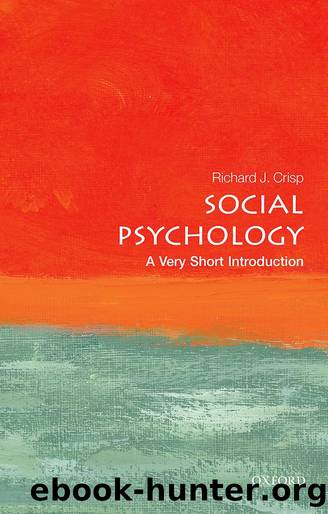Social Psychology by Richard J. Crisp

Author:Richard J. Crisp [Crisp, Richard J.]
Language: eng
Format: epub
ISBN: 9780198715511
Publisher: OUP Oxford
Published: 2015-06-26T00:00:00+00:00
Social facilitation
As weâve seen, attitudes predict behaviour (under the right conditions), but sometimes being in a group has a direct effect on behaviour that is unmediated by attitudes. The study of group processes is an area of social psychology that intersects with the sort of social influence studies discussed in this chapter, but with a greater focus on group productivity and performance.
As discussed in Chapter 1, the phenomenon of social facilitation was investigated in the first ever social psychology experiment. Norman Triplett was interested in whether, in the presence of others, people perform better at whatever task they do (be this athletics, music, or work-based tasks). Triplett asked his participants (who were school children) to turn fishing reels as fast as they could. In one condition the children were asked to carry out the task individually, in the other in pairs. What he found was when the children performed in pairs they turned the fishing reels far more quickly than when they were asked to do the task alone.
Subsequent research has attempted to develop theories to explain social facilitation effects. A prominent explanation is evaluation-apprehension. Evaluation-apprehension is not so different from normative influenceâit is anxiety at the thought of being judged by a crowd. Here, however, the focus is on performance (behaviour) rather than attitude expression. The idea is that evaluation-apprehension causes heightened physiological arousal (heart rate, adrenaline, etc.), which stimulates the body to perform simple actions more quickly (e.g. clapping loudly, riding a bicycle). This increases peopleâs capacity to make a dominant (well-learned) response.
In support of this theory, studies have found that when audiences are blindfolded, the facilitation effect disappears. However, the effect has even been observed in animals such as insects, and chickens lay more eggs when other chickens are around. Evaluation-apprehension cannot explain social facilitation effect in animals, who presumably arenât concerned with making a good impression! Some researchers have therefore suggested that while concern about being judged may well increase physiological arousal, some arousal occurs simply through being around othersâwhich can account for both the human and animal observations.
Arousal explanations also explain why sometimes a social facilitation effect occurs and sometimes the opposite is observedâa social inhibition effect. Research has found that while the presence of others enhances the speed with which people perform simple tasks, it inhibits task efficiency in more complex tasks. For example, in the presence of others people clap more vigorously, but are less likely to successfully complete a maths test. Since simple tasks are easy and well learned we tend to see social facilitation on these types of behaviour rather than more complex behaviours.
Strong support for the dominant response idea comes from the observation that experts show social facilitation on complex tasks. For instance, pool players have been found to play pool better with an audience than without, and the same can be said for many sports (performance being optimal âon the dayâ). This is because for experts even complex behaviours are well learned within their domain of expertise.
However, in humans
Download
This site does not store any files on its server. We only index and link to content provided by other sites. Please contact the content providers to delete copyright contents if any and email us, we'll remove relevant links or contents immediately.
The Art of Thinking Clearly by Rolf Dobelli(10489)
The 5 Love Languages: The Secret to Love That Lasts by Gary Chapman(9815)
Mindhunter: Inside the FBI's Elite Serial Crime Unit by John E. Douglas & Mark Olshaker(9341)
Becoming Supernatural by Dr. Joe Dispenza(8217)
Nudge - Improving Decisions about Health, Wealth, and Happiness by Thaler Sunstein(7706)
The Road Less Traveled by M. Scott Peck(7603)
Mastermind: How to Think Like Sherlock Holmes by Maria Konnikova(7346)
Enlightenment Now: The Case for Reason, Science, Humanism, and Progress by Steven Pinker(7313)
Win Bigly by Scott Adams(7197)
The Way of Zen by Alan W. Watts(6614)
Factfulness: Ten Reasons We're Wrong About the World – and Why Things Are Better Than You Think by Hans Rosling(4742)
The State of Affairs by Esther Perel(4719)
Gerald's Game by Stephen King(4654)
Man's Search for Meaning by Viktor Frankl(4606)
The Confidence Code by Katty Kay(4260)
Thinking in Bets by Annie Duke(4226)
The Healing Self by Deepak Chopra(3578)
Hidden Persuasion: 33 psychological influence techniques in advertising by Marc Andrews & Matthijs van Leeuwen & Rick van Baaren(3565)
The Worm at the Core by Sheldon Solomon(3487)
